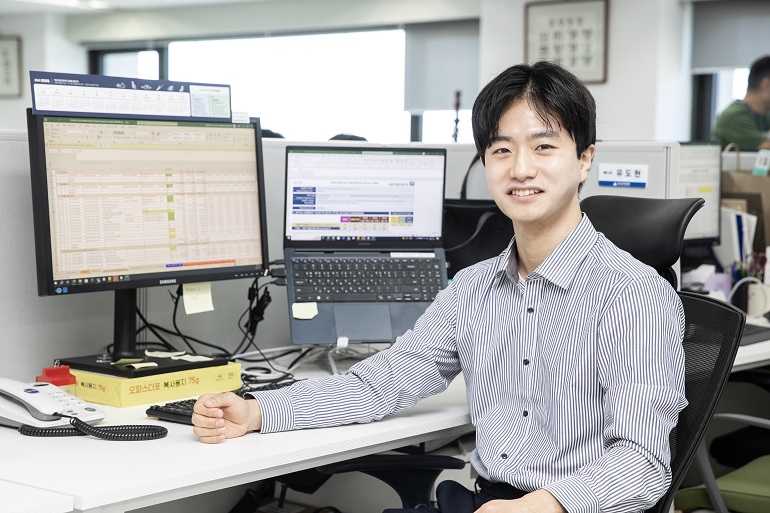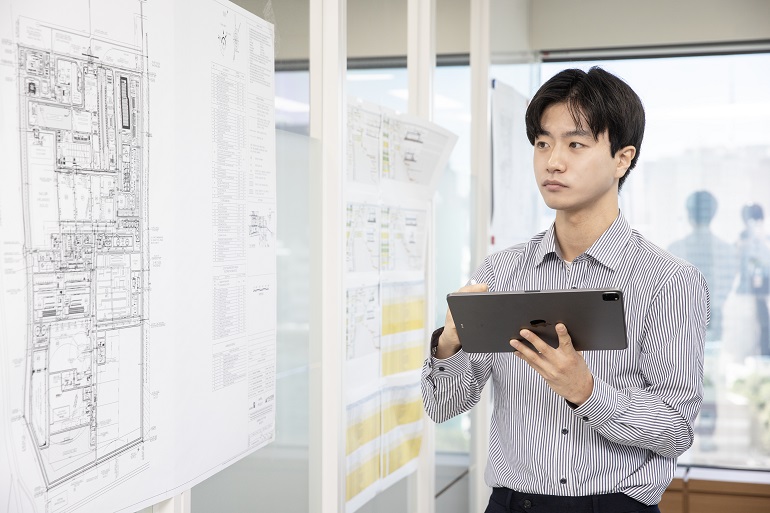
Latest News
- Hyundai E&C Becomes Key Player in the Nuclear Decommissioning Market
- Hyundai E&C Accelerates Global Nuclear Expansion into the U.S. Nuclear Market
- Hyundai E&C Shifts into High Gear to Enter Nordic Large-Scale Nuclear Market
- Hyundai E&C Strengthens Korea-Japan Cooperation in Energy Transition and New Growth Businesses
- Hyundai E&C Signals Green Light for Large-Scale Nuclear Power Plant Business in Europe
[Job Interview] Overseas Site Plant Chemical
"My knowledge of plant specialties and my continued interest in the industry helped me join the company."
by Manager Yoo Do-hyeon (Saudi Arabia Amiral Utilities and Facilities Construction, Seoul Office)

Q1. Please tell us about your job
I am in charge of project budget management in the Seoul office that prepares and supports overseas sites. I am basically handle managing all EPC budgets and checking the delivery status to ensure that funds are used smoothly on site. The role includes managing design budgets, organizing ready-made bills and inputs for equipment, managing manpower and equipment mobilization, reconciling details, and preparing reports for submission to the client. The most important role is to secure and check the budget, which is the foundation of all work.
Q2. What competencies do you need most in your job?
Due to the nature of budgeting, the most essential competency is “meticulousness”. You need to make sure that even a single dollar isn't going somewhere else, and that you haven't left anything out when you prepare the data. Also, it's important to be fast. Due to the nature of budgeting, you'll receive a lot of urgent requests from many different teams, so you may need to quickly fulfill them in addition to your day-to-day tasks.

Q3. How did you prepare for joining the company?
It is important to prepare for job interviews by learning basic major knowledge related to plants. In my undergraduate studies, I took relevant major classes such as fluid mechanics, process control, heat transfer, mass transfer, and process simulation to gain basic knowledge of chemical plant equipment and operation. I also took plant training at external organizations to gain practical knowledge that I could not learn as an undergraduate, such as the overall process from ordering to execution to commissioning, process planning, etc. My continued interest in the plant industry eventually helped me land a job.
Q4. Is there a corporate culture or system at HDEC that you would like to share?
In our company, it’s possible to form good relationships with all kinds of people. At Hyundai E&C, the most important thing is the relationship made while working at the same site. You can stay close to the people you meet on site for as little as four years or as long as six years, and even after the project is over, the relationships you make with various people can help you in your future work.
Another advantage is that you can experience a wide range of roles, from headquarters to domestic and overseas sites. Although working overseas may be a bit unfamiliar at first, I think it's a great way to broaden your horizons and learn, and the company rewards you accordingly, so I would say it's worth it to experience working abroad.
Q5. Do you have any advice for juniors who want to work at HDEC?
As you prepare to find a job, the term “chemical engineering job” may be a bit unfamiliar, so let me simply explain. Chemical engineering work is broadly divided into design and execution. In design, you'll be working on process design, and in execution, you can work in commissioning or business support. Commissioning is the department that makes sure that the plant is working according to the desired conditions after it has been built, and it's critical to understand the plant-specific processes. Project support team is responsible for all documentation on site. They need to be aware of all the processes and progress of the plant from order to execution to commissioning, so knowing the overall process of a chemical plant is very useful for their work.

